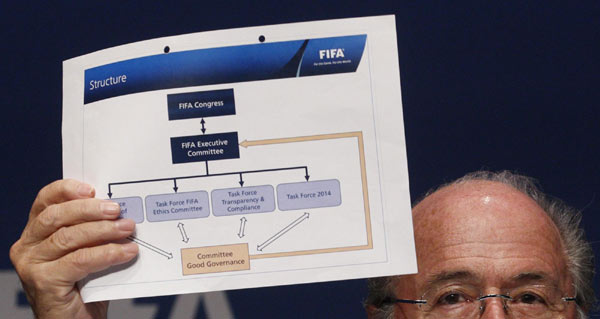Blatter announces anti-corruption measures
 0 Comment(s)
0 Comment(s) Print
Print E-mail
China Daily, October 24, 2011
E-mail
China Daily, October 24, 2011
 |
|
FIFA President Sepp Blatter holds up a diagram showing FIFA's new structure as he attends a news conference after the meeting of the Executive Committee at the Home of FIFA in Zurich, Oct 21, 2011. [Photo/Agencies] |
New watchdog committee confirmed
FIFA president Sepp Blatter announced his long-awaited anti-corruption plan on Friday including a pledge to re-open the case into the collapse of former marketing partner International Sport and Leisure (ISL).
Blatter, re-elected for a fourth term in June which he says will be his last, also announced the creation of a new "good governance committee", featuring figures from outside FIFA, and three task forces.
The committee would include representatives of clubs, leagues, players, referees and women's football, among others.
One task force would look into changes to the FIFA statutes, a second would look at changes to the ethics committee and a third would be responsible for introducing changes to make FIFA more transparent.
These would be added to an existing task force aimed at making the sport itself more attractive in time for the 2014 World Cup.
All proposals were passed by the executive committee on Friday and Blatter said he wanted concrete results by the time of the FIFA Congress in June 2013.
However Blatter said that he had abandoned his idea of involving Henry Kissinger, the 88-year-old former US Secretary of State, to act as an independent watchdog in one of FIFA's new committees
"I have to apologise because I did mention some big names at the Congress, but the former Secretary of State will not be in this governance committee, because we want to have someone who is active in politcs now - a member of parliament or a minister, involved in the day-to-day work."
At the time the FIFA president also mentioned opera singer Placido Domingo as a possible member of the watchdog.
Blatter continued: "I think we have been rather ambitious in our road map, its a Formula One model, but we need to move forward.
"I feel very fulfilled, very happy that the executive committee is completely in step with what we want to achieve with the national associations.
"We are moving forward with a FIFA that, thanks to the good governance committee, which is a bit of a watchdog and will allow us in 2013, maybe even before, to present an image slightly better than the one we have currently.
"We want a fair image, which shows the will of the FIFA leadership to not dwell on the past, to face up to its problems and find solutions. Tackling problems isn't enough, we need to find solutions.
"When FIFA is attacked, the president is attacked and I have to defend the institution and myself, I hope this transparency will help us put our past concerns behind us."
Regarding the ISL case, he said: "This is an issue which has been raised by the national associations and members of FIFA, the executive committee of FIFA has decided that this case should be opened.
"We will give this file therefore to an independent organisation on the outside of FIFA so they can delve into this file and present them to us, that is all I can tell you on this famous ISL file," he said.
FIFA added in a statement: "However, this can only be done after a thorough legal analysis because of the complexity of the matter. The case will be opened at the next meeting of the executive committee in December 2011.
ISL went bankrupt in 2001. BBC's Panorama programme said last November that documents relating to a criminal investigation into the ISL collapse are believed to show that senior FIFA officials were paid kickbacks in return for granting ISL lucrative World Cup television and sponsorship rights during the 1990s.
Panorama named them as Ricardo Teixeira, Issa Hayatou and Nicolas Leoz, all executive committee members. The three have denied any wrongdoing.
Teixeira is president of the Brazilian Football Confederation and the 2014 World Cup organising committee.





